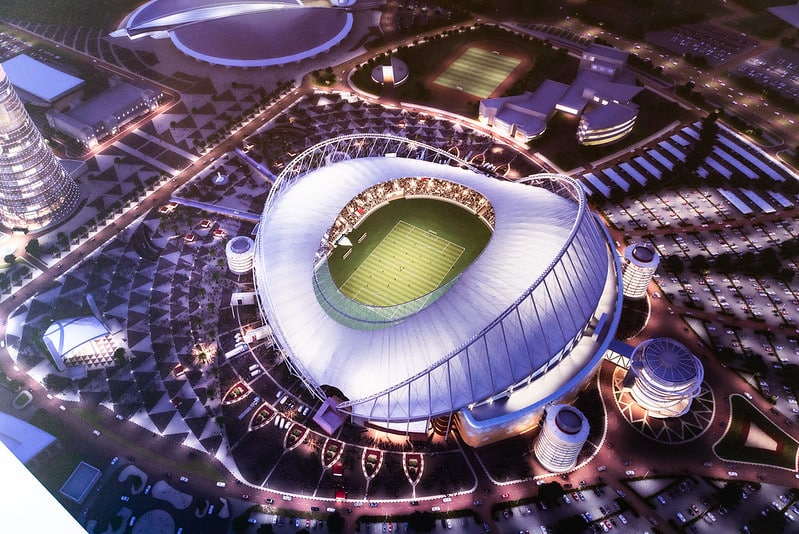*Editor’s Note: The “Views from NAU” blog series highlights the thoughts of different people affiliated with NAU, including faculty members sharing opinions or research in their areas of expertise. The views expressed reflect the authors’ own personal perspectives.
 By Paul E. Lenze, Jr.
By Paul E. Lenze, Jr.
Teaching professor, Department of Politics & International Affairs, and director of MPA Special Programs
I love soccer. I’ve been a soccer player and spectator for 40 years. Growing up the son of a U.S. Army officer, I moved all over the U.S. and the world. One indelible memory from my childhood is being on a family vacation in Rome in July 1990 when Germany won the World Cup. Being 12 years old at the time, the energy in the city, the restaurants and hotel was palpable every afternoon and evening when the games came on. The comradery, emotion, passion and nationalism on display were very evident. It was exciting to be a part of such a powerful moment for a team, a country and its fans.
While that excitement still resonates with me, the knowledge I’ve gained as a professor of international relations has given me a deeper understanding of what the world has deemed “The Beautiful Game.” In fact, many of my Intro to World Politics students over the years have read a book by journalist Franklin Foer entitled “How Soccer Explains the World.” His book delves into the politics of the game and highlights how soccer is the perfect metaphor to explain globalization and, more importantly, its effects. Put simply, Foer argues that the game of soccer mirrors the long-standing political and economic debates surrounding liberalism v. nationalism; the last 50 years witnessing the rise of large multinational corporations, the persistence of nationalism and tribalism, international and domestic policies resulting in the accumulation of great wealth (and power) among certain elite alongside income equality, increased corruption, exploitation of global labor and human rights violations.
The World Cup starts this Sunday, Nov. 20, in Qatar, bringing renewed attention to these issues. While these issues will not stop many of us from watching the game we love, this is an informational piece meant to highlight how the game became so political, the consequences of these issues in today’s world and what you can do to be more informed.
FIFA, or the Federation Internationale Football Association, is an international governing body headquartered in Geneva, Switzerland, that oversees the game of soccer. It was founded in 1904 to oversee the national associations of Belgium, Denmark, France, Germany, the Netherlands, Spain, Sweden and Switzerland and now encompasses 211 national associations that govern soccer within their respective states, led by an executive committee that is led by a president and secretary general. Furthermore, each of the national associations is a member of one of six regional confederations: Africa; Asia; Europe; North and Central America and the Caribbean; Oceania; and South America. It is the confederations’ responsibility to organize tournaments within their respective regions and to meet in FIFA congresses every four years to select host sites for the World Cup, usually years in advance. Until 1974, FIFA was considered an amateur supranational body, but the election of João Havelange would begin a professionalization of the organization, which included the corporatization of the organization.
The mid-to-late 1970s would also see neoliberal economics infuse the international political economy with its promotion of the free market and especially free trade policies. Domestically, this meant multinational corporations (MNCs) would seek out cheaper labor and actively lobby for a reduced role of the state in the economy. Internationally, states and MNCs actively sought to remove hindrances to trade, use comparative advantage and Foreign Direct Investment. Consequently, there was a tremendous amount of wealth and power earned. However, not every state benefited the same way. In essence, a hierarchy developed, which led international relations scholars to study the Global North vs. the Global South. Specifically, the effects institutions of the wealthier north had on the political and economic development of the Global South. By the late 1970s and into the 1980s, economic interdependence was growing between national economies, MNCs were becoming more influential, and states were less able to pursue their own national economic strategies. Our world was becoming more interdependent by our own making, creating interdependence through a network of rules, norms and decision-making procedures within international institutions. As many individuals and states were becoming wealthier throughout the 1980s and 1990s, two challengers to this process presented themselves: economic nationalists, who favored the power of countries over MNCs and institutions, and Marxists, who argued that global capitalism had created a system of dependency whereby Global South countries are the site of resources for extraction and will remain underdeveloped by wealthy elites, leaving those economies to be poor, dependent and exploited.
Consequently, globalization’s benefits have not been shared equally, which has led to the rise of the anti-globalization movement in the 1990s and 2000s, which posits that deregulated financial markets and trade agreements led to MNCs having unregulated political power. Many of these critics argued that “ruling elites” were seeking to use the global economic market for their own interests. International institutions such as the International Monetary Fund and World Trade Organization were benefiting the wealthier states in the Global North, which allowed them to have influence globally by moving freely across borders, extracting desired natural resources and using human resources for their own desired monetary ends. These events described above help us make sense of FIFA, its scandals and the desire of states like Qatar to participate in the system and receive its rewards despite the public outrage that results.
As mentioned above, FIFA became corporatized with Havelange becoming its president in 1974. Havelange brought on Sepp Blatter to find ways to bring the institution more money. By 1976, Blatter reached out to FIFA’s first corporate sponsor, Coca-Cola, for its youth development program and would then work with Horst Dassler, the president of Adidas, to take over global marketing of soccer through his ISL marketing company. These contracts would be worth millions of dollars, and as the recent Netflix documentary “FIFA Undercover” argues, kickbacks would be given to Blatter and other executives on FIFA’s executive council. This would create a norm that this was just how business was done. Also, since global soccer is divided up into confederations, with each having one vote per member nation, politicking for votes became a norm. Elites within these confederations, as well as the national soccer associations, wanted a slice of the economic pie that was growing larger year after year. Put simply, Havelange and Blatter created an institution that would use the neoliberal capitalist system to the institution’s and their benefit. Consequently, a culture of corruption, bribes and hubris would set in as a few elites (Havelange, Blatter and the executive council) sought to profit and became infatuated with power, especially around being able to award the World Cup to a host nation.
An elite’s, institution’s or state’s profit motive often blinds to the humanitarian costs. We see this with the awarding of the 1938 Olympics to Hitler’s Germany and the 1978 World Cup to Argentina. This is known as sportswashing, a term coined 10 years ago, to define individuals, groups and MNCs who use sports to improve reputations tarnished by wrongdoing. This is what Qatar was accused of doing in 2009, so it would be selected to host the 2022 World Cup.
The selection of a World Cup host happens at least eight years prior to a nation hosting in order for the infrastructure, such as stadiums, transportation systems and hotels be in place in time. In 2009, FIFA announced that they would accept bids simultaneously for the 2018 and 2022 World Cups. Given the history of politicking for votes within FIFA and the acceptance of norms around bribery, in the late 1990s and early 2000s, then-president Jack Warner of CONCACAF, the association responsible for North American soccer, was willing to sell his vote to ensure the World Cup be held in South Africa, since Warner’s home of Trinidad and Tobago was home to a large African diaspora who had long wanted a World Cup in South Africa. As the “FIFA Uncovered” documentary details, Warner and an American soccer executive named Chuck Blazer would conspire multiple times to accept bribes for votes. This was common practice as part of a larger culture of corruption that Blatter, president of FIFA since 1998, was a part of and abetted.
Therefore, Qatar, a peninsula jutting into the Persian Gulf that is smaller than Connecticut, with enormous oil and natural gas resources, run by the al-Thani royal family, desired to be an economic power in the Persian Gulf region to rival Saudi Arabia’s influence. Bidding for the World Cup would be a step in this direction, and the politicking and bribery began. This all came to light as FIFA elites became sloppy, and the extent of the larger culture of corruption became well known because of the FBI arresting Blazer and him turning state evidence before his death in 2017. This also brought to light the negative effects of globalization and neoliberalism that many opponents had been warning about; namely the effects of economic migration in the Global South, such as forced labor.
After being awarded the World Cup in 2009, Qatar had to build seven new stadiums, refurbish one stadium, build a new airport, a transportation network of additional roads and a subway, and 100 hotels to host the games. This massive undertaking required Qatar to have 30,000 migrant laborers come to the country from Bangladesh, India, Pakistan, Sri Lanka and Nepal. Given the importance neoliberal capitalism places upon privatization and cost reductions, another system of exploitation developed known as the kafala system. This is used to monitor migrant laborers, working primarily in construction and other domestic sectors in Gulf Cooperation Council countries, such as Bahrain, Kuwait, Lebanon, Qatar, Oman, Saudi Arabia and the United Arab Emirates. This system requires the workers to have an in-country sponsor responsible for the worker’s visa and legal status. Many of the employers will hold onto the visa and not let workers leave the country; they will also dock pay for days not worked, even adding an extra day of missed pay. This puts a tremendous amount of stress on these workers, not just in terms of their own personal health, but of their families who may not know where they are or are likely reliant on the pay sent back home. This has come under increased scrutiny from human rights organizations who have reported that thousands of workers have died building the World Cup stadiums. Meanwhile, Qatar accuses many of the worker’s home countries and the human rights organizations of inflating these numbers. Regardless, the fact that these abuses have happened bring to light the effects of capitalism on those living in the Global South.
Critics of globalization will continue to bring to light these human rights abuses that occur around every World Cup, as they should. Capitalism is a system that creates inequality and puts profit, or power, over equality. Therefore, it is important for those of us who love the world’s beautiful game to continue to bring these injustices to light. As Dr. Martin Luther King, Jr. once said, “Injustice anywhere is a threat to justice everywhere.”
Soccer is a microcosm of the development of our global political economy in the 20th and 21st centuries. To learn more about how you can stand up to these injustices, I urge you to visit Amnesty International’s website to learn about global human rights issues and the Solidarity Center to learn about global labor issues.
Top photo: Khalifa International Stadium in Doha, Qatar. Photo credit: Fundación Cajasol with a non-commercial license.




 By Paul E. Lenze, Jr.
By Paul E. Lenze, Jr.